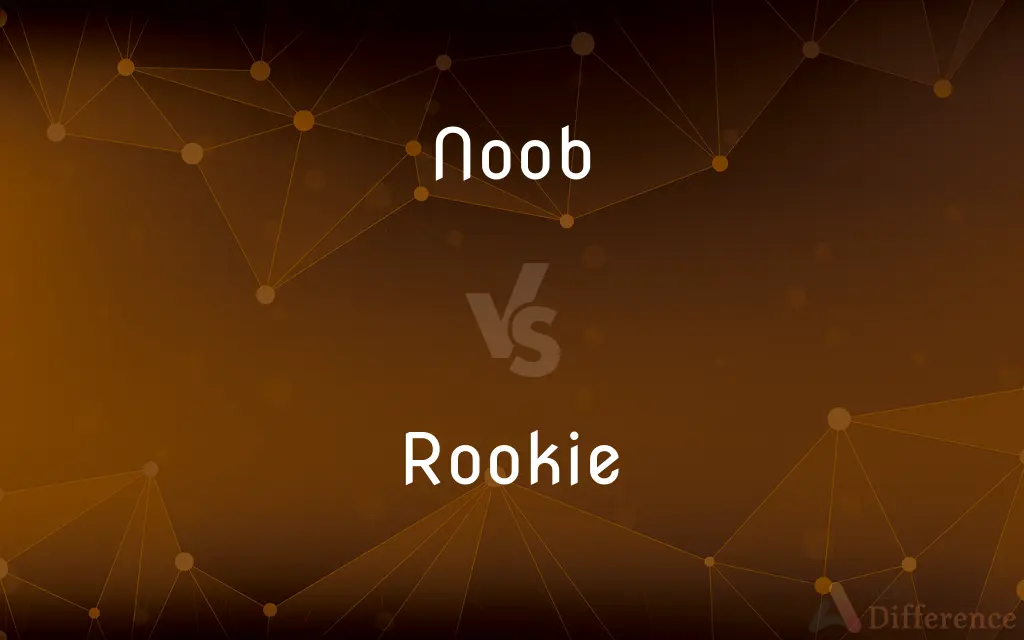Noob vs. Rookie — What's the Difference?
By Tayyaba Rehman & Fiza Rafique — Updated on April 27, 2024
A noob is an inexperienced and often inept person, particularly in online gaming or computer contexts, while a rookie is a beginner in a profession or sport, learning skills but capable.

Difference Between Noob and Rookie
Table of Contents
ADVERTISEMENT
Key Differences
A noob, often spelled "newb" or "n00b", is a slang term derived from "newbie" that implies more than just being new; it suggests a lack of skill, understanding, and often an unwillingness to learn. On the other hand, a rookie is a recognized term for a newcomer in any professional field or sport, indicating a legitimate, often temporary status as they learn and grow.
In the context of usage, 'noob' is generally used in informal, especially online, environments to describe someone who is inept at a specific task or game. It carries a connotation of frustration from others due to the individual's perceived incompetence or failure to improve. Whereas, 'rookie' is used more formally and respectfully, acknowledging the beginner status without negative implications about the person’s skill or effort.
Noobs are often associated with making fundamental mistakes and not learning from them, which can annoy other, more experienced users or players. Conversely, rookies are expected to make mistakes as part of their learning process but are also expected to benefit from guidance, improve over time, and eventually master their roles.
In terms of perception, noobs can be viewed negatively, sometimes as irritants within gaming or online communities due to their lack of knowledge and skill. In contrast, rookies are typically supported and encouraged as they have committed to learning a profession or skill and are on a clear path to improvement.
While both terms describe beginners, the term noob is more derogatory and less likely to be self-applied, whereas individuals often proudly identify as rookies within their professions as they progress and develop their abilities.
ADVERTISEMENT
Comparison Chart
Origin
Slang from "newbie", pejorative
Formal, from "recruit"
Context
Mostly in gaming and online
Professional fields and sports
Connotation
Negative, ineptitude
Neutral, learning phase
Perception
Often unwanted
Welcomed and nurtured
Improvement Expectation
Not expected or slow
Expected and observed
Compare with Definitions
Noob
A derogatory term used to describe an inexperienced and inept person, especially in online settings.
He was called a noob for repeatedly failing the same level.
Rookie
Viewed more formally and respectfully compared to noobs.
The rookie award was given to the most promising new player of the season.
Noob
Associated with frustration for both the user and others.
The team lost patience with the noob who ignored all strategic plans.
Rookie
Expected to make mistakes as part of the learning process.
The rookie made a few errors but was quickly learning from them.
Noob
Used primarily in informal contexts like gaming.
The chat was full of experienced players teasing the noobs.
Rookie
Associated with potential and growth.
The coach was impressed with the rookie's rapid improvement.
Noob
Often implies a lack of willingness to learn or improve.
Despite advice, the noob kept making the same mistakes.
Rookie
A beginner in any profession or sport, often still learning the ropes.
The rookie cop was partnered with an experienced detective to learn the job.
Noob
Can be seen as insulting or humorous, depending on context.
They jokingly referred to themselves as noobs in the new video game.
Rookie
Acknowledges a period of adjustment and learning.
As a rookie in the law firm, she worked hard to prove her capabilities.
Noob
A newb or newbie; refers to the idea that someone is new to a game, concept, or idea; implying a lack of experience. Also, in some areas the word noob can mean someone is obsessed with things.
Noobs are annoying, they never know the forum rules.
Rookie
A rookie is a person new to an occupation, profession, or hobby. In sports, a rookie is a professional athlete in their first season (or year).
Rookie
A new recruit, especially in the army or police
A rookie cop
Rookie
An untrained or inexperienced recruit, as in the army or police.
Rookie
An inexperienced person; a novice.
Rookie
(Sports) A first-year player, especially in a professional sport.
Rookie
An inexperienced recruit, especially in the police or armed forces.
Rookie
A novice.
Rookie
An athlete either new to the sport or to a team or in his first year of professional competition, especially said of baseball, basketball, hockey and American football players.
Rookie
(British) A type of firecracker, used by farmers to scare rooks.
Rookie
Non-professional; amateur
The game was going well until I made that rookie mistake.
The rookiest of rookie mistakes
Rookie
An awkward and inexperienced youth
Common Curiosities
Is it insulting to call someone a rookie?
No, calling someone a rookie is usually not considered insulting; it simply identifies their newcomer status.
Are noobs and rookies the same in terms of experience?
Both are inexperienced, but noobs are often viewed as unwilling to learn, unlike rookies who are expected to grow and improve.
Can the term noob be used positively?
While typically negative, 'noob' can be used in a humorous or self-deprecating way among friends.
What is a noob?
A noob is someone who is new and inexperienced in a particular context, often lacking skill and not showing quick improvement.
How long does someone remain a rookie?
The duration can vary by field but generally until they gain enough experience to perform competently on their own.
What makes a good rookie?
A good rookie is eager to learn, open to feedback, and committed to continuous improvement.
What defines a rookie?
A rookie is a newcomer in a professional or sport field, acknowledged as being in the initial phase of learning and development.
What is the best way to handle being called a noob?
It’s best to focus on improving skills and understanding the context better, possibly seeking help from more experienced peers.
Do rookies receive special training?
Yes, rookies often receive formal training and mentorship to help them transition into their new roles effectively.
How are noobs treated in online games?
Treatment can vary from supportive to dismissive, depending heavily on the community and the individual’s attitude.
Can someone be a noob in one area and an expert in another?
Absolutely, being a noob is context-specific and does not reflect overall ability or intelligence.
Are there benefits to being a rookie?
Yes, being a rookie comes with opportunities to learn from the ground up, often with the support of mentors and structured growth paths.
What should a team do if they have a noob?
Patience and constructive guidance can help integrate and improve a noob’s performance and understanding.
How can rookies accelerate their learning?
Rookies can benefit greatly from seeking feedback, being proactive in learning, and observing experienced colleagues.
Why might someone prefer to be called a rookie rather than a noob?
'Rookie' carries a connotation of legitimacy and potential, while 'noob' is often seen as derogatory and dismissive.
Share Your Discovery

Previous Comparison
Decumbence vs. Recumbence
Next Comparison
Kinghood vs. KingshipAuthor Spotlight
Written by
Tayyaba RehmanTayyaba Rehman is a distinguished writer, currently serving as a primary contributor to askdifference.com. As a researcher in semantics and etymology, Tayyaba's passion for the complexity of languages and their distinctions has found a perfect home on the platform. Tayyaba delves into the intricacies of language, distinguishing between commonly confused words and phrases, thereby providing clarity for readers worldwide.
Co-written by
Fiza RafiqueFiza Rafique is a skilled content writer at AskDifference.com, where she meticulously refines and enhances written pieces. Drawing from her vast editorial expertise, Fiza ensures clarity, accuracy, and precision in every article. Passionate about language, she continually seeks to elevate the quality of content for readers worldwide.














































